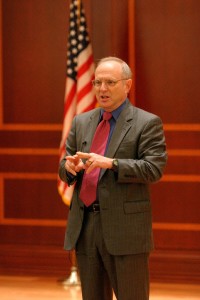‘Genius of America’ based on individual rights, rabbi says
2006 Shurden Lectures
By Associated Baptist Press
Baptists and Jews, both having suffered historically as minority faiths, share a strong commitment to religious liberty, Rabbi David Saperstein said during the inaugural Walter B. and Kay W. Shurden Lectures on Religious Liberty and Separation of Church and State April 4-5.
Saperstein has directed the Washington-based Religious Action Center for Reform Judaism for 30 years. At the Shurden Lectures, this year at Mercer University, Saperstein said that “robust religious liberty, free of government interference, is the indispensable component” that Jewish and Baptist communities share in common.
The lectureship was created through a gift to the Baptist Joint Committee for Religious Liberty from Walter and Kay Shurden. Walter Shurden is the founding executive director of Mercer’s Center for Baptist Studies. The Georgia Baptist Convention founded Mercer in 1833, although the convention recently severed the affiliation.
BJC Executive Director Brent Walker and Saperstein, both attorneys, work closely with lawmakers on religious freedom issues and have jointly taught classes on First Amendment church-state law at Georgetown University.
The “genius of America,” Saperstein said, is that rights are granted to individuals rather than to groups, from which an individual can be excluded or excommunicated.
“It doesn’t matter if all 290 million Americans … believe your way of worshiping is wrong,” Saperstein said, adding that individuals retain freedom of religious expression.
Saperstein also said the Framers of the U.S. Constitution “did something evolutionary” in clearly stating that citizenship does not depend on one’s religious convictions.
Those who claim America as “a Christian nation,” Saperstein said, must look to the early Puritan settlers who “really believed they were the new Israel” and “created a political structure based entirely on God’s law.” Those who later framed the U.S. Constitution “captured the spirit” of religious liberty that has been upheld by the courts through the years, Saperstein added.
He noted that now-retired Supreme Court Justice Sandra Day O’Connor provided the deciding vote outlawing government-sponsored prayer in public schools. “Sandra Day O’Connor is not there!” said Saperstein, expressing concern about whether new justices will continue to keep Americans free from majoritarian religious views and control.
Saperstein said Jews—”the quintessential victims of religious persecution”—have not won cases before the Supreme Court but have benefited from decisions on cases brought by Seventh-Day Adventists and other religious minorities.
No country in the world, Saperstein said, has more people participating in religious communities than the United States. He also said the claim that “separation of church and state is anti-religion or anti-God” is not true.
The principles of complete religious liberty advocated by Baptist pioneers Isaac Backus and John Leland “have served us,” Saperstein said. “Jews I know who care about this study the Baptists.”
Return to main Shurden Lectures page





